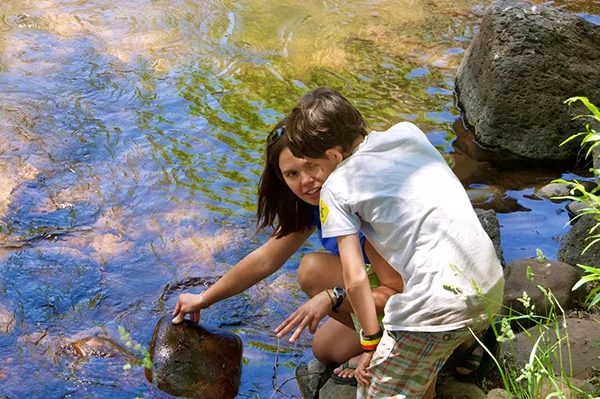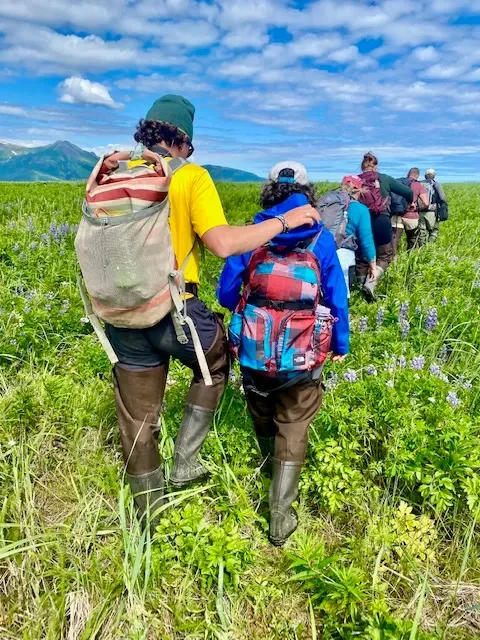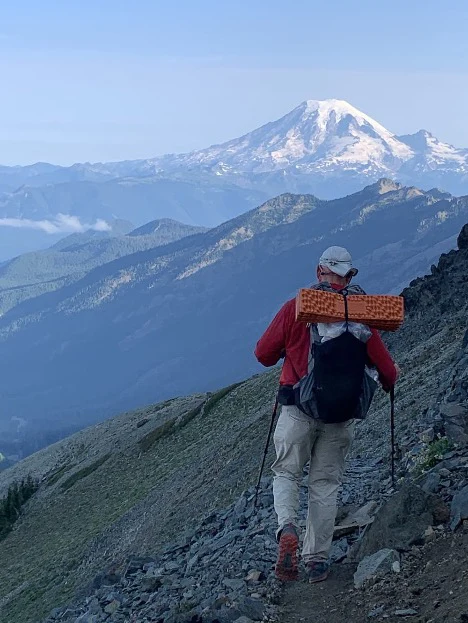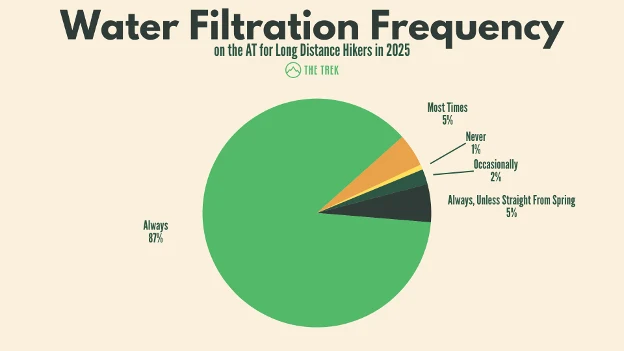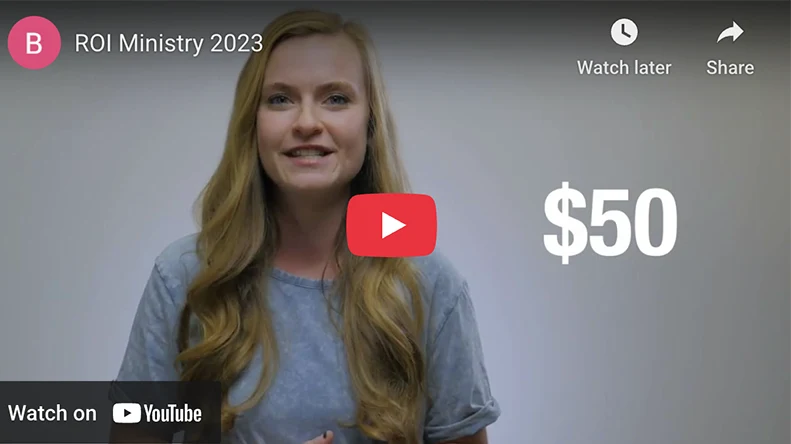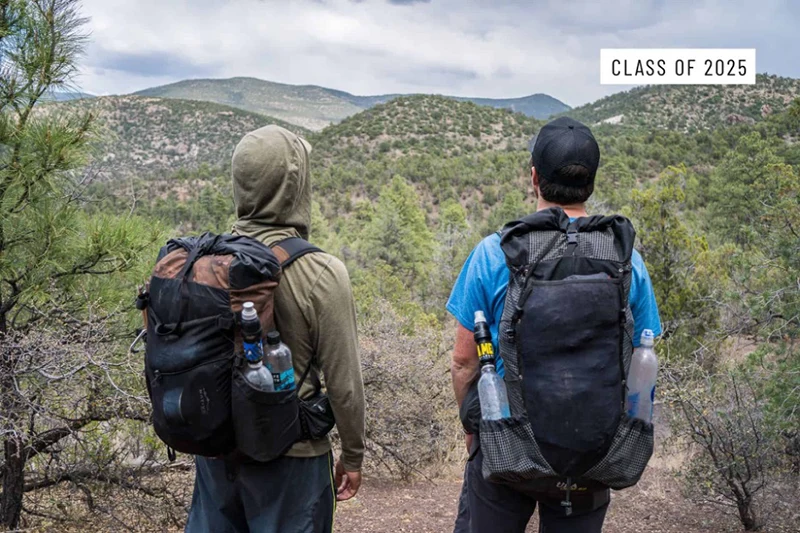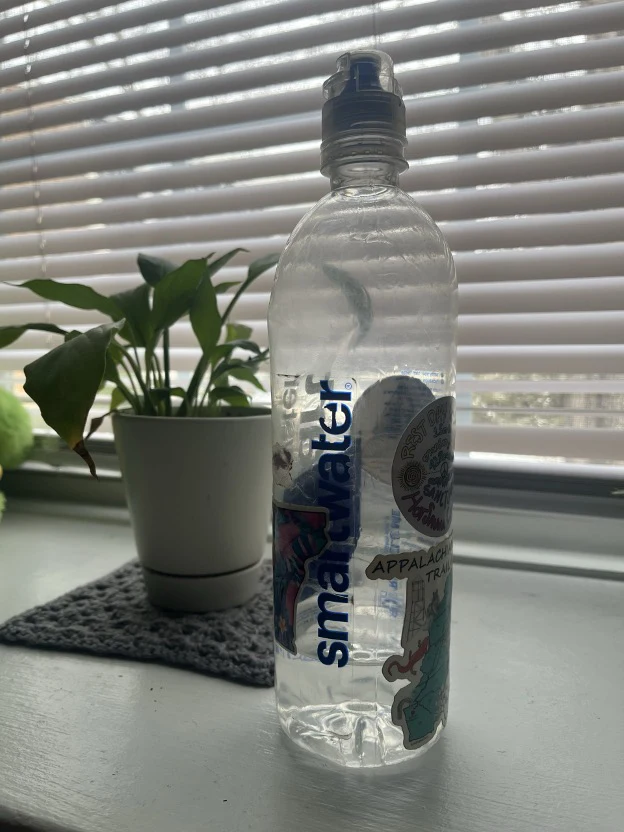5 Boundless Ways to Enjoy Nature This Mother’s Day
5 Boundless Ways to Enjoy Nature This Mother’s Day

5 Boundless Ways to Enjoy Nature This Mother’s Day
YouTube video highlight
Throughout my journey of motherhood I've learned that every outing in nature can be educational and a chance to spark curiosity and imagination.
Read more about the projectI recently visited my 19-year-old son, Johnny, over parents' weekend at his college, and we had an amazing time. On Friday nights at the Student Life Center, there’s an open pool session where kayakers can practice strokes and rolling. We went to the pool, put on swimsuits and sprayskirts, and paddled about. Johnny was bracing and rolling effortlessly. For me, it’s been a while. I’m also dealing with some shoulder tendonitis. I was hesitant. He was encouraging.
“C’mon mom, you helped me learn to roll. Now, let’s see your roll.”
I wasn’t feeling it. I did not want to disappoint or wet exit. I did not want to embarrass myself or hurt my shoulder. But I was mostly just afraid of being upside down in the water without a roll. He said I’ll rescue you. He got out of his boat and was treading water. We were in the deep end. He said, “Trust me, I got you, mom.”

I recalled a time 10 years earlier when we were messing around on the Uncompagre River in Colorado. I was below a rapid in a calm pool, and Johnny was going to surf the rapid. He paddled in and flipped. He did not roll, nor did he wet exit.
It was really scary for him, but in a split second, I flipped his boat back up, and we had a moment. “I got you, honey,” I said.
Back in the present, I tipped my boat on purpose, upside down in the water, waiting. And in a split second, without me doing a thing, no hip snap, no hand sweep, no nothin, my son righted the boat and up I came with a dripping wet smile. What a rush. We both cracked up. He said it’s a rescue called “the hand of god.” Or in this case, the hand of my son!

Imaginative Inspiration for Silly Mamas
Getting out of one’s comfort zone is a sure way to grow. As Mother’s Day approaches I’ve been reflecting on the ways I’ve embraced challenges and new experiences throughout my journey of motherhood learning that through worldschooling, every outing in nature can be educational and a chance to spark curiosity and imagination.
Outdoor play fosters skills for life like critical thinking, collaboration, problem-solving, grit, and self-confidence.

Here are five fun, boundless ideas for you to adapt and make your own, for littles and big kids, whether you’re out for an afternoon, a weekend, a month or a Wonder Year:
- Cloud storytelling: Kick back and watch the clouds together as a family. Make up a story as new characters, shapes, blobs, or animals move across the big sky stage.
- Make a band with sounds of nature: Fun “instruments” like sticks, rocks, crumply dried leaves, clanging pebbles, and splashing water are at your fingertips in the outdoors. What background sounds can you hear? Are there bird whistles that can be part of the composition?
- Transportation Imagination: Embrace silliness through sounds, gestures, and imaginative play to really drive this point home. If you were a train, what sounds would you make going uphill? What if you were snowboarding or biking the whole way, how might you approach a turn, a bump, a rock?

- Nature Sketching (no skill required): Choose your favorite crayons or pack of markers to accompany you on an outdoor outing. Take a few moments and sketch the forest canopy, the understory. What textures do you see on the bark? Are there knots, pods, burls, or moss? Have fun with textures, colors, and perspective - and remember, everyone’s an artist.
- See how you measure up to nature: First measure how long your arms are, then use your body to compare trees you see on your hike. What’s the biggest tree you can find? How many arms are needed to get around it? Can you use your arms to measure the length of your tent? What else can you measure?

Respecting Appropriate Boundaries
It is important to recognize there are many good and necessary boundaries that we need to respect. To be responsible and respectful travelers, we have to know where it’s okay to camp, on whose land, and how close to waterways. There are local regulations and policies in place to protect and preserve resources, wildlife and cultural heritage. For worldschooling families, this is especially important because everywhere has their own unique set of rules.

Learning about these boundaries is a wonderful educational opportunity. We can stay humble, respect local knowledge, and listen to those we know and trust.
One excellent program is Leave No Trace, which uses research and education to protect the natural world. The 7 Principles of Leave No Trace to establish an enlightened, science-based framework, a set of good boundaries, that help people in the outdoors minimize impact in all kinds of environments, from our own backyards to remote wilderness areas.
Whether we're venturing into the known or unknown, we can use these guidelines to tread lightly, stay safe, and do our part to protect natural and cultural resources for future generations.
Read more on How to Teach Kids to Be Nature Defenders in this article by Reagan Fulton on the Sawyer Blog.

This May, let’s celebrate and honor all the Outdoors Mamas. Wishing you tons of fun and co-discovery in the boundless adventure of parenting.
Happy Mother’s Day!
5 Boundless Ways to Enjoy Nature This Mother’s Day


I recently visited my 19-year-old son, Johnny, over parents' weekend at his college, and we had an amazing time. On Friday nights at the Student Life Center, there’s an open pool session where kayakers can practice strokes and rolling. We went to the pool, put on swimsuits and sprayskirts, and paddled about. Johnny was bracing and rolling effortlessly. For me, it’s been a while. I’m also dealing with some shoulder tendonitis. I was hesitant. He was encouraging.
“C’mon mom, you helped me learn to roll. Now, let’s see your roll.”
I wasn’t feeling it. I did not want to disappoint or wet exit. I did not want to embarrass myself or hurt my shoulder. But I was mostly just afraid of being upside down in the water without a roll. He said I’ll rescue you. He got out of his boat and was treading water. We were in the deep end. He said, “Trust me, I got you, mom.”

I recalled a time 10 years earlier when we were messing around on the Uncompagre River in Colorado. I was below a rapid in a calm pool, and Johnny was going to surf the rapid. He paddled in and flipped. He did not roll, nor did he wet exit.
It was really scary for him, but in a split second, I flipped his boat back up, and we had a moment. “I got you, honey,” I said.
Back in the present, I tipped my boat on purpose, upside down in the water, waiting. And in a split second, without me doing a thing, no hip snap, no hand sweep, no nothin, my son righted the boat and up I came with a dripping wet smile. What a rush. We both cracked up. He said it’s a rescue called “the hand of god.” Or in this case, the hand of my son!

Imaginative Inspiration for Silly Mamas
Getting out of one’s comfort zone is a sure way to grow. As Mother’s Day approaches I’ve been reflecting on the ways I’ve embraced challenges and new experiences throughout my journey of motherhood learning that through worldschooling, every outing in nature can be educational and a chance to spark curiosity and imagination.
Outdoor play fosters skills for life like critical thinking, collaboration, problem-solving, grit, and self-confidence.

Here are five fun, boundless ideas for you to adapt and make your own, for littles and big kids, whether you’re out for an afternoon, a weekend, a month or a Wonder Year:
- Cloud storytelling: Kick back and watch the clouds together as a family. Make up a story as new characters, shapes, blobs, or animals move across the big sky stage.
- Make a band with sounds of nature: Fun “instruments” like sticks, rocks, crumply dried leaves, clanging pebbles, and splashing water are at your fingertips in the outdoors. What background sounds can you hear? Are there bird whistles that can be part of the composition?
- Transportation Imagination: Embrace silliness through sounds, gestures, and imaginative play to really drive this point home. If you were a train, what sounds would you make going uphill? What if you were snowboarding or biking the whole way, how might you approach a turn, a bump, a rock?

- Nature Sketching (no skill required): Choose your favorite crayons or pack of markers to accompany you on an outdoor outing. Take a few moments and sketch the forest canopy, the understory. What textures do you see on the bark? Are there knots, pods, burls, or moss? Have fun with textures, colors, and perspective - and remember, everyone’s an artist.
- See how you measure up to nature: First measure how long your arms are, then use your body to compare trees you see on your hike. What’s the biggest tree you can find? How many arms are needed to get around it? Can you use your arms to measure the length of your tent? What else can you measure?

Respecting Appropriate Boundaries
It is important to recognize there are many good and necessary boundaries that we need to respect. To be responsible and respectful travelers, we have to know where it’s okay to camp, on whose land, and how close to waterways. There are local regulations and policies in place to protect and preserve resources, wildlife and cultural heritage. For worldschooling families, this is especially important because everywhere has their own unique set of rules.

Learning about these boundaries is a wonderful educational opportunity. We can stay humble, respect local knowledge, and listen to those we know and trust.
One excellent program is Leave No Trace, which uses research and education to protect the natural world. The 7 Principles of Leave No Trace to establish an enlightened, science-based framework, a set of good boundaries, that help people in the outdoors minimize impact in all kinds of environments, from our own backyards to remote wilderness areas.
Whether we're venturing into the known or unknown, we can use these guidelines to tread lightly, stay safe, and do our part to protect natural and cultural resources for future generations.
Read more on How to Teach Kids to Be Nature Defenders in this article by Reagan Fulton on the Sawyer Blog.

This May, let’s celebrate and honor all the Outdoors Mamas. Wishing you tons of fun and co-discovery in the boundless adventure of parenting.
Happy Mother’s Day!
5 Boundless Ways to Enjoy Nature This Mother’s Day


I recently visited my 19-year-old son, Johnny, over parents' weekend at his college, and we had an amazing time. On Friday nights at the Student Life Center, there’s an open pool session where kayakers can practice strokes and rolling. We went to the pool, put on swimsuits and sprayskirts, and paddled about. Johnny was bracing and rolling effortlessly. For me, it’s been a while. I’m also dealing with some shoulder tendonitis. I was hesitant. He was encouraging.
“C’mon mom, you helped me learn to roll. Now, let’s see your roll.”
I wasn’t feeling it. I did not want to disappoint or wet exit. I did not want to embarrass myself or hurt my shoulder. But I was mostly just afraid of being upside down in the water without a roll. He said I’ll rescue you. He got out of his boat and was treading water. We were in the deep end. He said, “Trust me, I got you, mom.”

I recalled a time 10 years earlier when we were messing around on the Uncompagre River in Colorado. I was below a rapid in a calm pool, and Johnny was going to surf the rapid. He paddled in and flipped. He did not roll, nor did he wet exit.
It was really scary for him, but in a split second, I flipped his boat back up, and we had a moment. “I got you, honey,” I said.
Back in the present, I tipped my boat on purpose, upside down in the water, waiting. And in a split second, without me doing a thing, no hip snap, no hand sweep, no nothin, my son righted the boat and up I came with a dripping wet smile. What a rush. We both cracked up. He said it’s a rescue called “the hand of god.” Or in this case, the hand of my son!

Imaginative Inspiration for Silly Mamas
Getting out of one’s comfort zone is a sure way to grow. As Mother’s Day approaches I’ve been reflecting on the ways I’ve embraced challenges and new experiences throughout my journey of motherhood learning that through worldschooling, every outing in nature can be educational and a chance to spark curiosity and imagination.
Outdoor play fosters skills for life like critical thinking, collaboration, problem-solving, grit, and self-confidence.

Here are five fun, boundless ideas for you to adapt and make your own, for littles and big kids, whether you’re out for an afternoon, a weekend, a month or a Wonder Year:
- Cloud storytelling: Kick back and watch the clouds together as a family. Make up a story as new characters, shapes, blobs, or animals move across the big sky stage.
- Make a band with sounds of nature: Fun “instruments” like sticks, rocks, crumply dried leaves, clanging pebbles, and splashing water are at your fingertips in the outdoors. What background sounds can you hear? Are there bird whistles that can be part of the composition?
- Transportation Imagination: Embrace silliness through sounds, gestures, and imaginative play to really drive this point home. If you were a train, what sounds would you make going uphill? What if you were snowboarding or biking the whole way, how might you approach a turn, a bump, a rock?

- Nature Sketching (no skill required): Choose your favorite crayons or pack of markers to accompany you on an outdoor outing. Take a few moments and sketch the forest canopy, the understory. What textures do you see on the bark? Are there knots, pods, burls, or moss? Have fun with textures, colors, and perspective - and remember, everyone’s an artist.
- See how you measure up to nature: First measure how long your arms are, then use your body to compare trees you see on your hike. What’s the biggest tree you can find? How many arms are needed to get around it? Can you use your arms to measure the length of your tent? What else can you measure?

Respecting Appropriate Boundaries
It is important to recognize there are many good and necessary boundaries that we need to respect. To be responsible and respectful travelers, we have to know where it’s okay to camp, on whose land, and how close to waterways. There are local regulations and policies in place to protect and preserve resources, wildlife and cultural heritage. For worldschooling families, this is especially important because everywhere has their own unique set of rules.

Learning about these boundaries is a wonderful educational opportunity. We can stay humble, respect local knowledge, and listen to those we know and trust.
One excellent program is Leave No Trace, which uses research and education to protect the natural world. The 7 Principles of Leave No Trace to establish an enlightened, science-based framework, a set of good boundaries, that help people in the outdoors minimize impact in all kinds of environments, from our own backyards to remote wilderness areas.
Whether we're venturing into the known or unknown, we can use these guidelines to tread lightly, stay safe, and do our part to protect natural and cultural resources for future generations.
Read more on How to Teach Kids to Be Nature Defenders in this article by Reagan Fulton on the Sawyer Blog.

This May, let’s celebrate and honor all the Outdoors Mamas. Wishing you tons of fun and co-discovery in the boundless adventure of parenting.
Happy Mother’s Day!




